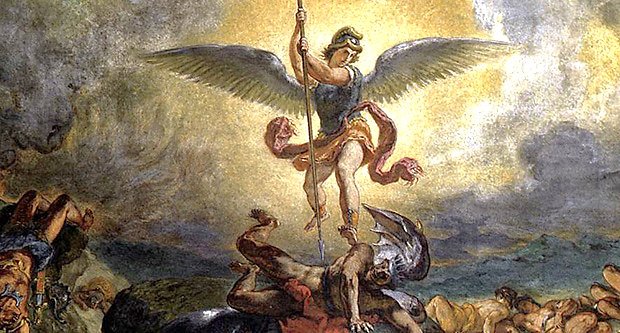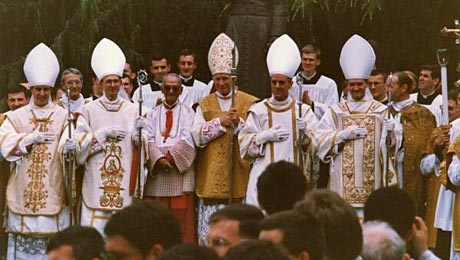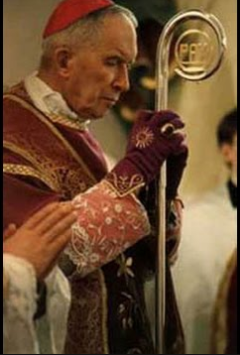You ought to read the book "Moscow and the Vatican," by the Jesuit, Father Lepidi. It is extraordinary. It shows the influence that the Communists had in Rome, and how they were responsible for the nomination of Bishops and even of two Cardinals: Cardinal Lekai and Cardinal Tomaseck. Cardinal Lekai, was the successor of Cardinal Mindszenty, and Cardinal Tomaseck was the successor of Cardinal Beran. Both Cardinal Mindszenty and Cardinal Beran were heroes and martyrs for the Faith. They were replaced by peace priests who were determined above everything else to come to an understanding with the Communist government who persecuted traditional priests. These traditional priests went secretly to baptize in the countryside or to secretly catechize so as to continue their work as pastors in the Catholic Church, and yet they were persecuted by their Bishops, who said to them: "You do not have the right not to respect the rules of the Communist government. You do us a disfavor by acting against its laws.”
But these priests were ready to give their life so as to keep the Faith of children, so as to keep Faith in families, and so as to give sacraments to those who had need of them. Obviously in these countries one had always to ask for authorizations, if one wanted to carry the Blessed Sacrament to a hospital or to do anything at all. As soon as they left their sacristy these priests were obliged to ask the Communist party if it authorized them to do this or that. This was impossible. People died without the sacraments. Children were no longer educated in a Christian way. So the priests had to do these things in secret. If they were caught it was often because the Bishops themselves persecuted them. It's frightening.
Neither Cardinal Wyszynski nor Cardinal Slipyi nor Cardinal Mindszenty nor Cardinal Beran would have done such things as these. They, to the contrary, encouraged good priests, saying to them: "Go ahead, go ahead. If you are put into prison you will have done your duty as a priest. If you must die martyrs then you will be martyrs.”
This shows how much influence they had on Rome. We have great difficulty in imagining it. We cannot even believe it.
I have never been against the Pope. I have never said that the Pope is not the Pope. I am absolutely for the Pope, for the successor of Peter. I do not want to separate myself from Rome. But I am against modernism, progressivism, and all the bad and destructive influences, which Protestantism has had via the reforms. I am against all those reforms, which poison us and poison the life of the faithful.
Thus I am told: "You are against the Pope." No, I am not against the Pope To the contrary, I come to help the Pope. For the Pope cannot be modernist; he cannot be progressivist. Even if he allows himself to be pushed around, it is by weakness. This can happen. St. Peter also was weak with respect to the Jews. And St. Paul severely reproached him for: “You do not walk according to the Gospel," he said to St. Peter. St. Peter was the Pope and St. Paul reproached him. And he did it vigorously: “I reproached the head of the Church because he was not walking according to the law of the Gospel." It was a grave thing to say this to the Pope.
St. Catherine of Siena also vehemently reproached several Popes. We must have the same attitude. We say: “Holy Father, you are not doing your duty. You must return to Tradition to be persecuted by all those Cardinals and Bishops who are modernists you are going to bring about the ruin of the Church."
I am sure that in his heart the Pope is profoundly concerned and that he seeks for a means to renew the Church. I hope that by our prayers and sacrifices and the prayers of those who love the Holy Church and who love the Pope we will succeed.
This will be especially by devotion to the Blessed Virgin Mary. If we pray to Our Lady, she who cannot abandon her Son, she who cannot abandon the Church that her Son founded, the mystical Spouse of her Son, we will be answered. It will be difficult and a miracle, but we will succeed.
As for myself, I do not want people to make me say that the New Mass is good, but that it is simply less good than the Traditional Mass. I cannot say that. I cannot say that these modern sacraments are good. They were made by Protestants. They were made by Bugnini. And Bugnini himself said on March 19, 1965, as can still be read in the “Osservatore Romano" and in “Documentation Catholique," which magazines published a translation of Bugnini's discourse:
“We must strip from our Catholic prayers and from the Catholic liturgy everything which can be the shadow of a stumbling block for our separated brethren, that is for the Protestants."
This was on March 19, 1965, just before all the reforms. Can we go to the Protestants and ask them concerning the Holy Sacrifice of the Mass, concerning our catechism? In what are you not in agreement? Do you not like this or do you not like that? ...Well we will suppress it. This is not possible. It would perhaps not be heretical to do so, but the Catholic Faith would be diminished. Thus it is that people no longer believe in Limbo, in Purgatory and in Hell. Original sin is no longer believed in, neither are the angels. Grace is not believed in. People no longer speak of that which is supernatural. Our Faith is being destroyed.
So we must absolutely maintain our Faith and pray to the most Blessed Virgin Mary. We desire to undertake a giant task, and without the help of the good Lord we will never be able to accomplish it. I am certainly aware of my weakness and of my isolation. What can I do by myself compared to the Pope or the Cardinals? I do not know. I go as a pilgrim, with my pilgrim's staff. I am going to say "keep the Faith." Keep the Faith. Be rather a martyr then abandon your Faith. You must keep the sacraments and the Holy Sacrifice of the Mass.
You cannot say: "But it is all different now. It is not too bad after all. As for me, I have a solid Faith and I'm not likely to lose it." For it is clear that those who habitually attend the New Mass and the new sacraments undergo a gradual change of mentality. After a few years it will become apparent in questioning somebody who goes regularly to this new ecumenical Mass that he has adopted its ecumenical spirit. This means that he ends up by placing all religions on the same footing. If he is asked whether one can save oneself through Protestantism, through Buddhism, or through Islam he will reply: "But of course. All religions are good." And there you have it. He has become liberal and Protestant and is no longer Catholic.
There is only one religion. There are not two of them. If Our Lord is God and founded a religion, the Catholic Religion, there can be no other religion. It is not possible. The other religions are false. That is why Cardinal Ottaviani used the title: "Concerning Religious Tolerance.”
Errors can be tolerated when they cannot be prevented. But they cannot be placed on the same footing as the truth. There could then be no missionary spirit. The missionary spirit could not then be possible. If all the false religions save souls then why go out on mission? What is one going to do there? We have only to leave them in their religion and they are going to all save themselves. This is not possible. What, then, has the Church done for twenty centuries? Why all the martyrs? Why were they all massacred on the mission? Did the missionaries waste their time? Did the martyrs waste their blood and their lives? We cannot accept that.
We must remain Catholic. The slide into ecumenism is very dangerous. Easily one falls into a religion, which is no longer the Catholic religion.
I sincerely wish that all could be witnesses of Our Lord, of the Catholic Church of the Faith, and of Catholicism, even if we have to be despised and insulted in the newspapers, in the parishes and in the churches. What does it matter? We are witnesses of the Catholic Church. We are the true sons of the Catholic Church and true sons of the Blessed Virgin Mary












